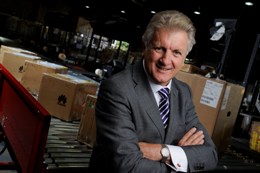DHL Express UK has grown strongly thanks to rising international and B2C volumes and will invest£156 million (€195 million) in the next two years to increase capacity for “ambitious” sales
targets in 2015 and beyond, CEO Phil Couchman told CEP-Research in an exclusive interview.“We have outgrown the market growth and have gained more customers,” Couchman said on thesidelines of a tour of the company’s East Midlands Airport hub. Currently celebrating its 40th yearin the UK, DHL Express has had double-digit growth in the last three years and claims to havesteadily increased its international air express (TDI) market share from 43 per cent in 2008 to 51per cent last year, putting it well ahead of its nearest rivals.
According to the company’s latest customer interaction survey, DHL Express UK is ranked ‘best of breed’ in 10 of 15 relevant categories, including overall customer satisfaction, customerloyalty, product range and delivery service, and joint best with rivals TNT, UPS and FedEx inseveral others such as value for money, prices and conditions. “I’m convinced we have betterservice and more motivated staff than the others,” Couchman claimed.
After selling the loss-making domestic parcels business in 2010, DHL has focused clearly onits core time-definite international (TDI) business in the UK in the last few years, althoughdomestic express remains important. In 2013, DHL Express handled more than 17 million shipments inthe UK, about half of which were domestic shipments rather than international.
Although country results are not disclosed, UK media have cited the company’s 2013 financialresults which show that turnover rose 11.7 per cent to £609 million and pre-tax profits doubled to£9.7 million, representing a 1.6 per cent profit margin.
“Everyone is pretty optimistic about things, exporters in particular,” Couchman said. “TheTrade Confidence Index is going up and things are positive. Both large and small customers aregrowing.”
Outbound volumes have slightly softened to single-digit growth rates this year, however, asdemand from the eurozone weakens and possibly due to a stronger pound, but imports are growingstrongly at low double-digit rates, he pointed out.
Among DHL’s key vertical industries, the automotive and healthcare sectors “are clearlygoing places” with their international growth while technology demand is being driven by productlaunches, in particular. Moreover, customers are actively demanding new services, Couchman pointedout. “Rolls-Royce is exporting to the USA and they want us to provide the best next-day service tothe US; for example, with flights to Cincinnati and next-morning delivery.”
The boom business, however, is online fashion retailing which has seen “stellar growth” overthe last 3½ years. High-end fashion items are being exported, for example, to the USA and WesternEurope while lower-value goods are heading for Eastern Europe.
In general, DHL Express has seen good growth in international B2C deliveries as foreignconsumers buy more goods from British e-retailers. For example, the company has seen strong demandfrom Russia for high-value UK brands. “The UK realised the opportunity (of cross-border e-commerce)earlier, especially in online fashion,” he pointed out. “It’s a growing opportunity for businessesto get their products to the rest of the world.”
DHL Express also provides B2C deliveries to UK addresses for customers where it also handlestheir international business, and particularly for technology customers. “As the B2C market hasgrown, the need for exact deliveries to private addresses has become much greater,” he commented.DHL is currently looking into various options for alternative delivery locations.
Asked about 2015 prospects, the long-serving DHL Express manager responded: “We haveambitious sales targets. The big investments we are making in facilities result from the confidenceof the DP DHL group in DHL UK and our ability to generate higher volumes.”
DHL Express has embarked on a major investment programme in the UK. After opening severalnew depots in 2013, the company announced in June 2014 plans to invest £156 million (€195 million)in several large projects by 2016 to increase network capacity. These include a £90 millionexpansion of its express hub at East Midlands Airport, a new £32 million southern hub facility nearHeathrow Airport, a new facility at Manchester Airport and new depots in Croydon (south of London)and Sheffield.
The new Sheffield depot has just opened while the new Manchester depot, replacing a smallerfacility, will open at the end of October, Couchman said. The greenfield site at Poyle, close toHeathrow, will comprise a fully-automated sorting centre and new UK head office, and will functionas the southern hub, serving London and southern England.
DHL Express UK has 3,250 employees, 1,350 vehicles and its network currently comprises 39service centres (depots), 1,200 Service Points, mostly at retail partners, and the two air hubs atEast Midlands Airport and London Heathrow.












